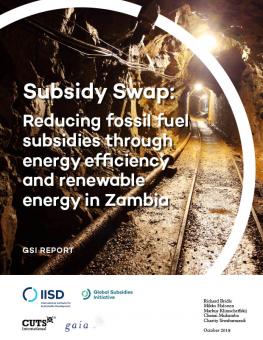
Subsidy Swap: Reducing fossil fuel subsidies through energy efficiency and renewable energy in Zambia
This report examines the potential of subsidy reform to improve cost recovery in the electricity sector and promote clean energy and energy efficiency in Zambia.
In Zambia’s electricity sector, demand has risen faster than supply.
In response to rising demand, several new power plants have been commissioned, including the 300 MW Maamba coal power plant and the 120 MW Itezhi Tezhi hydropower plant in 2016. Subsidies, particularly in the form of under-recovery of electricity sector revenues caused by below-cost pricing, have led to electricity sector deficits and threatened the financial sustainability of the sector.
Price increases in the electricity sector in 2017 of 75 per cent have reduced electricity sector subsidies, but costs remain higher than revenues. This report explores how subsidy reform could help to reduce the cost of subsidies and promote a transition to energy efficiency and clean energy. The report focuses on the mining sector, which is responsible for more than half of all electricity consumption, and the potential of solar PV.
Participating experts
You might also be interested in
The United Kingdom, New Zealand, and Colombia Join Coalition to Phase Out Fossil Fuel Subsidies
Today on the sidelines of the UN Climate Conference in Baku (COP 29), the United Kingdom, New Zealand, and Colombia joined the international Coalition on Phasing Out Fossil Fuel Incentives Including Subsidies (COFFIS).
COP 29 Must Deliver on Last Year’s Historic Energy Transition Pact
At COP 29 in Baku, countries must build on what was achieved at COP 28 and clarify what tripling renewables and transitioning away from fossil fuels means in practice.
How Indonesia's Incoming President Can Advance the Transition to Clean Energy
With Prabowo Subianto inaugurated as Indonesia’s President, speculation abounds about the new administration’s commitment to the clean energy transition and climate targets, given Prabowo’s positioning as the “continuity candidate.” The question is, what, exactly, will be continued?
Public Financial Support for Renewable Power Generation and Integration in the G20 Countries
G20 governments provided at least USD 168 billion in public financial support for renewable power in 2023, less than one third of G20 fossil fuel subsidies that year.